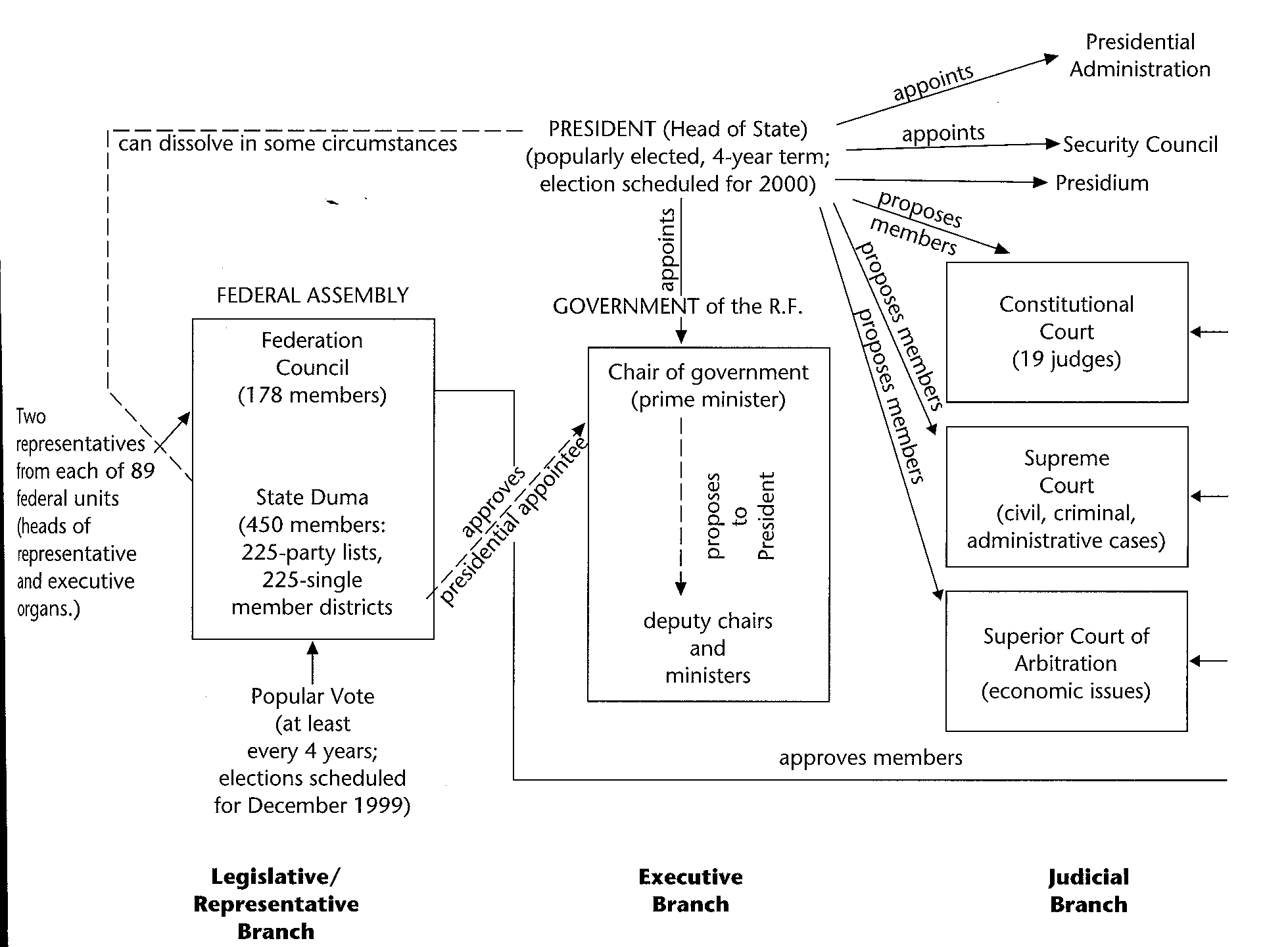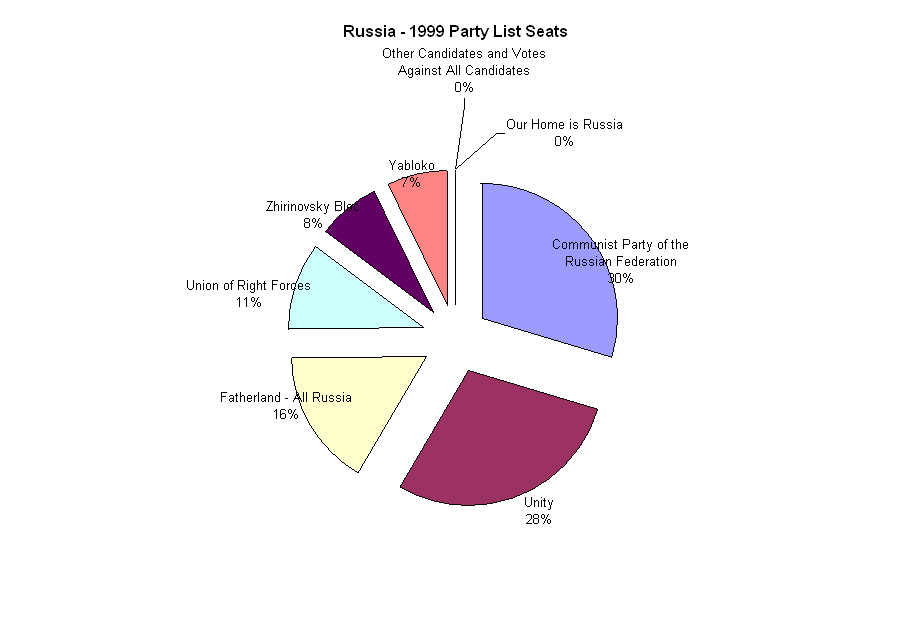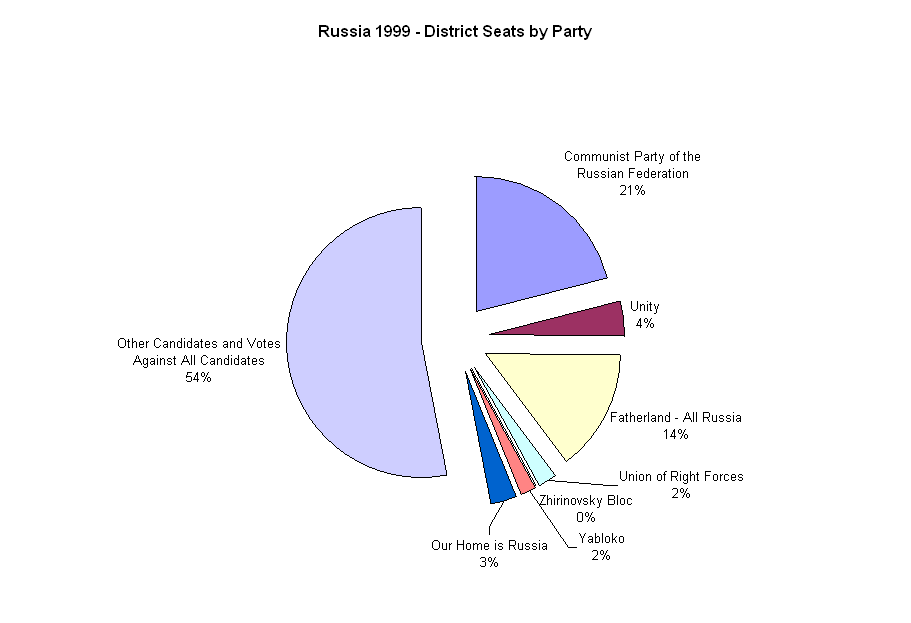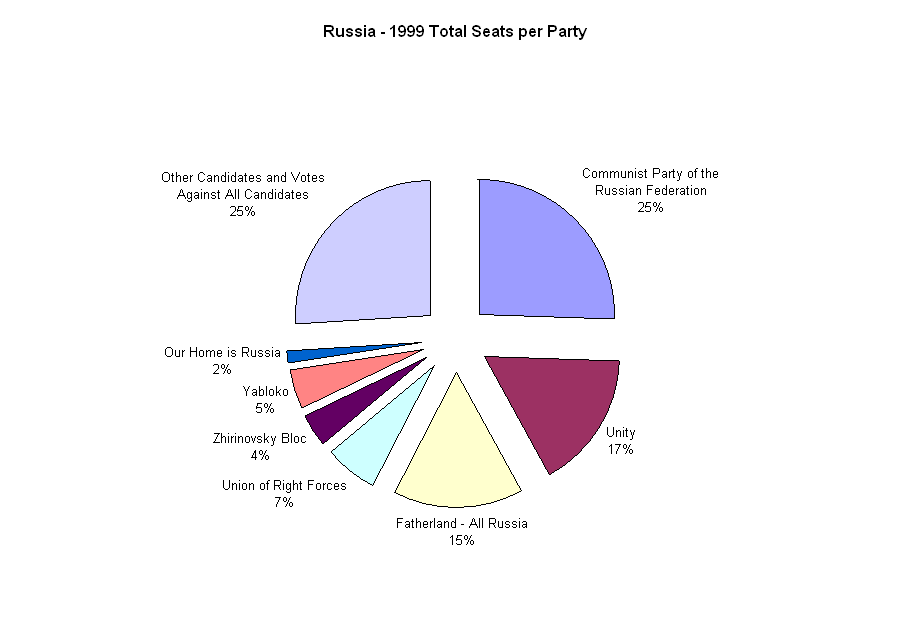
Russia's Politics - Part 3 Governance and Policy-making
I. Major changes
a. Strong one party system to weak multi-party system
b. Strong executive
c. Federalism in flux
II. Strong one party system
a. CPSU - dominated by upper organs - Secretariat, Politburo, Central Committee
1. Dominated all state structures - provided policy oversight
2. Nomenklatura - top state posts filled by party members
b. Regular state structures - Supreme Soviet - had limited decision-making power
1. Party decisions more important than rule of law
a. judiciary not autonomous
III. Transition during Gorbachev
a. Introduces competitive elements into one-party elections - multiple candidates, enhanced role for legislature
b. 1990-1991 - power moves from Party to state hands; Yeltsin elected President
c. 1993 - New constitution adopted by referendum
Political Institutions of the Russian Federation,
1993 - 2003
(taken from page 453 in Kesselman)

IV. Current governing institutions
1. President:
a. Elected by direct election for 4 years, 2 term maximum, two-round election with run-off between two leaders if no one gains 50%
b. appoints Prime Minister
c. Has strong power to "decree" laws
1. state of emergency, martial law
2. grant pardons, call referendum
3. Suspend actions of other state organs if thought to be in violation of Constitution
d. can be impeached
| RUSSIA: March 26, 2000, Presidential Election | |||
|
Registered Voters: Votes Cast: Valid Votes: Invalid Votes: |
109,372,046 75,070,776 74,369,776 701,003 |
[68.64% of Registered Voters] [99.07% of Votes Cast] [.93% of Votes Cast] |
|
| CANDIDATE | PARTY | VOTES | %[OF VALID VOTES] |
| Vladimir Putin | Independent Candidate | 39,740,434 | 53.44% |
| Gennady Zyuganov | Communist Party (KPRF) | 21,928,471 | 29.49% |
| Grigory Yavlinsky | "Yabloko" | 4,351,452 | 5.85% |
| Aman Tuteyev | Independent Candidate | 2,217,361 | 2.98% |
| Vladimir Zhirinovsky | Liberal Democratic Party of Russia (LDPR) | 2,026,513 | 2.72% |
| Other Candidates and Votes Against All Candidates | X | 4,105,542 | 5.52% |
2. Prime Minister
a. Chosen by President, but approved by Duma - appoints other officials within government (no Duma approval needed)
b. PM and govt. issue resolutions and directives, submit legislation to Duma
3. Federal Assembly
a. Bicameral
1. Duma - main house - elected 4 years, 450 seats, 1/2 PR (using the whole country as a district, 5% minimum) + 1/2 single member districts
a. electoral system results in odd relationship of votes to seats, due esp. to large # of small parties failing to gain min 5%.
b. Speaker - elected by the Duma, represents the largest party faction
2. Federation Council - one executive and one legislative rep. chosen from each of 89 regions, 178 seats
a. members appointed by the top executive and legislative officials in each of
the 89 federal administrative units -
oblasts, krays, republics, autonomous okrugs and oblasts, and the federal cities
of
Moscow and St. Petersburg; members serve four-year terms
V. Political Parties
a. Generalizations
1. Other than Communist Parties, parties have:
a. weak defined social basis
b. very limited party identification among voters
c. feature publicly visible "personalities" as their leaders
d. are of limited duration (come and go)
e. have limited presence in Duma
f. have uncertain ties to President
g. have limited party discipline
h. rarely offer clear base of support for Prime Minister
2. Ideological and programmatic basis for parties
a. These are fluid but can roughly be divided along these issues:
| Issues | Left | Center | Right | |||||||||||||||||||||||||||||||||||||||||||||||||||||||||||||||||||||||||||||
| Transition to capitalism | Go slow, retain strong role for state sector, subsidize weak firms, worry about welfare of poor, disabled, weak, unemployed | Move ahead with market reforms but prevent
"abuses" and avoid shocks when possible, include provisions for
welfare state
|
Shock therapy, quick privatization, sale of land, free market in prices, end state subsidies, fiscal discipline | |||||||||||||||||||||||||||||||||||||||||||||||||||||||||||||||||||||||||||||
| Democracy | Supports but with law and order | Supports but with "law and order" | Supports favors western style | |||||||||||||||||||||||||||||||||||||||||||||||||||||||||||||||||||||||||||||
| Foreign Policy | More nationalistic, might have preoccupation with former glory of Soviet Union (Zhirinovsky), support operations in Chechyna, oppose expansion of NATO, etc | Flexible on NATO, not esp. concerned to resurrect Soviet power, but agrees with operations in Chechyna and need for strong military (but concerned with costs of sustaining it) |
Opposes resurrection of Soviet power, opposes operations in Chechyna, less concerned about NATO, create favorable trading relations within CIS and outside | |||||||||||||||||||||||||||||||||||||||||||||||||||||||||||||||||||||||||||||
| Summary of Recent Russian
Elections
Executive:
Source: www.rferl.org/Central
Election Commission (TsIK)
Source: Parties and Elections Main political parties:
Questions to consider: 1. Regimes have changed in Russia - but does that mean that "political development" has occurred? 2. Can the regime be successful as a democracy without a strong party system? Have we examined any countries with weak party systems that have managed to survive as democracies? 3. What will be the form of evolution of the Russian regime? Will it move more in the French direction or semi-presidentialism, or will it gravitate to the US model of presidentialism? 4. What will Russia's social and economic model look like in ten or twenty years? How will its 70 years of socialism impact its movement towards capitalism or a mixed economy? Will short-term difficulties cause so much social distress that a backlash might occur? What would such a backlash accomplish? How will globalization impact Russia? 5. How will the forces of nationalism and a sense of lost empire impact the foreign and domestic policies of the country?
|
||||||||||||||||||||||||||||||||||||||||||||||||||||||||||||||||||||||||||||||||
| RUSSIA: December 19, 1999, Duma Election (next election 2003) | |||||
|
Registered Voters: Votes Cast: Valid Votes: Invalid Votes: |
108,072,348 65,370,655 65,240,663 129,992 |
[60.49% of Registered Voters] [99.80% of Votes Cast] [.20% of Votes Cast] |
|||
|
Half of the 450 seats
are filled by direct elections in constituencies while the remaining 225
are filled from party lists according to each party's share of the
popular vote. The number of votes reflects the amount each party
received under party list voting.
|
|||||
| PARTY | PARTY LIST VOTES | PARTY LIST SEATS | %[OF PARTY LIST VOTES] | DISTRICT SEATS | TOTAL SEATS |
| Communist Party of the Russian Federation (anti-market) | 16,195,569 | 67 | 24.29% | 46 | 113 |
| Unity (a Yeltsin product, closest to Putin) | 15,548,707 | 64 | 23.32% | 9 | 73 |
| Fatherland - All Russia (coalition formed by Mayors of Moscow and St. Petersburg - centrist, hawkish on foreign affairs)) | 8,886,697 | 37 | 13.33% | 31 | 68 |
| Union of Right Forces (pro-market, supported Putin) | 5,676,982 | 24 | 8.52% | 5 | 29 |
| Zhirinovsky Bloc (nationalist) | 3,989,932 | 17 | 5.98% | 0 | 17 |
| Yabloko (pro-market, social democratic, dovish on foreign affairs) | 3,955,457 | 16 | 5.93% | 4 | 20 |
| Our Home is Russia (former Yeltsin creation, out of favor...) | 791,160 | 0 | 1.19% | 7 | 7 |
| Other Candidates and Votes Against All Candidates | 10,196,159 | 0 | 15.69% | 115 | 115 |


